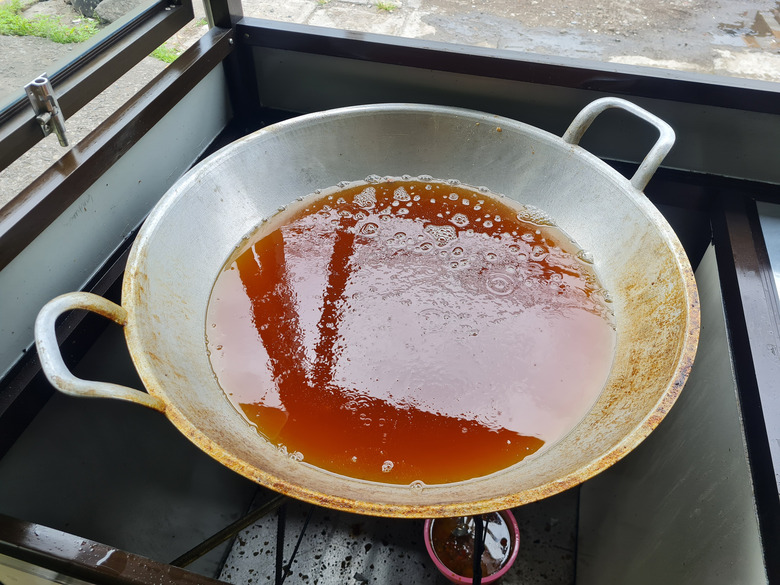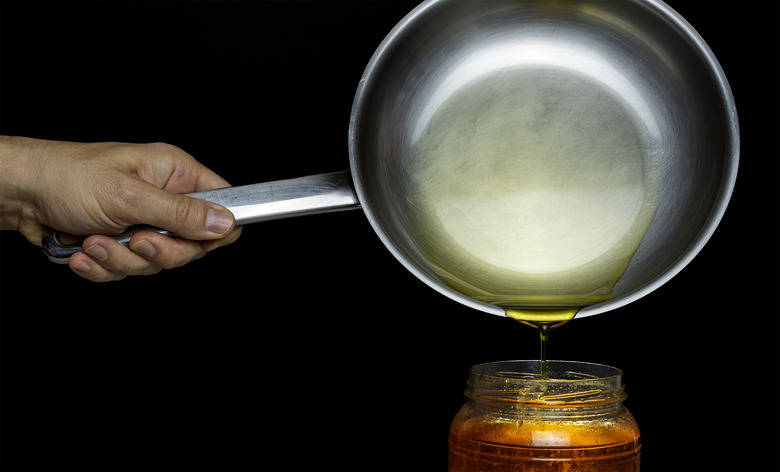How To Dispose Of Grease And Cooking Oil
We may receive a commission on purchases made from links.
If you know how to dispose of grease and cooking oil properly, you're doing your part for the environment and your plumbing system. The proper disposal method is definitely not to dump hot cooking grease into the kitchen sink. That's a recipe for sewer backups, and even if the grease does make it through to the treatment plant, it complicates wastewater processing, which ultimately results in higher operating costs and wasted tax money.
The consequences of improper grease disposal are even more severe for a home on a septic system because the end result could be a drain field clog. That's a serious and expensive problem for which the only remedy may be a completely new drain field.
Bacon grease, used cooking oil, and cooking fat are inevitable byproducts in any kitchen unless the people in the household eat only raw, uncooked foods. Even if that describes your household, you're probably still going to generate used oil that you need to throw away. Here's how to dispose of cooking oil and grease safely.
How to Dispose of Grease and Cooking Oil
How to Dispose of Grease and Cooking Oil
Raise your hand if you've taken the easy way out more than once and poured a skillet full of hot cooking grease into the kitchen sink. You may have even poured it into the garbage disposal, hoping that it would somehow get mashed into a harmless state, safely mix with the other food scraps, and get washed away — but it won't. Even if you do this only occasionally, you're asking for trouble. Cooled cooking oil behaves like nonflushable cat litter that you dump into the toilet — rather than going down the drain, it collects in the pipes, and because it isn't water-soluble, the resulting buildup turns into blockages that can be hard to clear.
Disposing of hot oil in the sink or toilet may be convenient, but it's a bad idea, and it isn't the only way to get the job done. In fact, there are several ways to do it, and some are just as easy and convenient as doing it the lazy way.
Throw Grease and Cooking Oil in the Trash
Throw out cooking fat and grease along with your other food waste. Of course, this doesn't mean to just pour hot grease into your trash can after deep frying some chicken. If you do that, you'll soon have a smelly mess, assuming the grease doesn't end up on the floor after melting a hole in the trash bag. To avoid such a scenario, let the cooking oil cool completely before throwing it away.
The easiest way to dispose of cooking oil is to pour it into a heavy-duty zip-top bag. Make sure it's cool first! It helps to have another person hold the bag while you pour in the oil. Leave some room in the bag, then carefully release the excess air before sealing the top; this helps it resist bursting open in the trash if items end up on top of it. If you don't have a zip-top bag, you can use any plastic bag without holes (which usually rules out grocery bags) and seal it closed with a rubber band.
For bacon grease and other fats that solidify at room temperature, simply pour the grease into an empty tin can or glass jar. Leave it out on the counter until the grease solidifies — or put it in the fridge to speed things up — then throw the can in the trash. You can pour hot grease into a tin can, provided the can is dry; it will splatter if there's any water in the can. Let the grease cool before pouring into glass, which could break if the grease is really hot.
Here's an alternative trick for disposing of hot grease using parchment paper:
- Line a bowl with parchment paper.
- Fill the bowl with hot grease and let it stand until it cools and solidifies.
- Lift out the paper, wrap it around the solidified grease, secure the bundle with a rubber, and toss it in the trash.
Check your local health regulations before discarding grease in the trash. A few municipalities prohibit any type of food waste in their landfill areas, including grease and oil, in an effort to control methane gas emissions.
Recycle Grease and Cooking Oil
Used cooking oil may be trash to you, but it can be a resource for local restaurants, and you won't know unless you ask. Call around, and if you find one that recycles used oil, you have an easy solution to your disposal problem. Pick large pieces of food out of your oil while it's still liquid. Collect the oil and grease in an airtight container, such as a glass jar or a metal coffee can, and keep the container in a cool place until you have enough used oil to make a worthwhile drop off.
Most communities also have recycling centers for used cooking oil, and some even pay for it because they use it to make biodiesel, a fuel used for vehicles and for heating. Contact your local waste management department or recycling center to find out more about disposing of your used cooking oil or grease. Besides being turned into biofuel, used grease and cooking oil are also common ingredients in animal food. Soap makers also occasionally use recycled oil, so if you know anyone who makes artisan soap, ask them if they can use your oil.
Reuse Leftover Cooking Oil and Grease
Store your leftover oil in glass jars and use it again. Do this only with oil that hasn't been heated to the point of smoking and wasn't used to cook fish. To prevent the oil from turning rancid and essentially becoming hazardous waste, you need to remove the food particles from the oil. One way to do this is to pour the oil through a strainer or a coffee filter — a simple but slow method. Another method uses corn starch to absorb the impurities:
- Mix 1/4 cup of water and a tablespoon of corn starch for every cup of leftover frying oil.
- Let the oil cool to room temperature and then pour in the corn starch mixture.
- Gently warm the oil on the stove, stirring continuously with a spatula until the corn starch fully congeals.
- Pour the remaining oil through a fine mesh strainer and throw out the congealed corn starch. The oil may appear cloudy at first, but it should clear up. You can reuse oil up to three times with this method.
Reusing leftover grease is even simpler. Here's how to safely store and reuse bacon grease and other animal fats:
- Allow the grease to cool slightly in the pan. It should be warm; don't let it cool to the point of solidifying.
- Pour the grease through a strainer to remove food particles and into a glass jar.
- Seal the jar with a lid, and keep it in the fridge. You can use the grease in place of oil to cook things like eggs, vegetables, fried rice, or anything else you fry up. The grease will add a slight smoky flavor to the food.
Tip
Before reusing cooking oil, smell it to make sure it hasn't turned rancid. You can also test with your fingers; good oil feels smooth when you rub it between the fingers, while rancid oil feels tacky.
Can I Pour Grease and Cooking Oil Down the Drain?
Can I Pour Grease and Cooking Oil Down the Drain?
Pouring any kind of oil, including cooking oil, down the drain is illegal in most places because of the damage oil can do to the sewer system and the environment. Cooking oil is particularly bad for sewers because it reacts with chemicals that are already there to form fatbergs, which are like icebergs only made from fat. They are soapy, waxy deposits that cling to the sides of the pipes, and they can grow very large, weighing as much as 100 tons. Besides stopping the flow of water and sewage, they can actually burst the pipes.
Oil in sewers and storm drains is an environmental hazard even if it doesn't form fatbergs. If drains overflow during a heavy rain event, the oil can spill onto the ground and into waterways, where it can poison plants and wildlife.
Grease and cooking oil are as bad for your plumbing as they are for the sewer. If you pour oil from your deep fryer into the drain while it's still hot, it can damage plastic pipes, and when it comes in contact with the water in the P-trap, it quickly cools and provides you with your own personal fatbergs.
Tip
If someone inadvertently pours hot grease down the kitchen sink, you may be able to clear some of it away by immediately pouring in baking soda and white vinegar or an enzyme-based drain cleaner. If that doesn't help, you may need a plumber.
Can I Pour Grease and Cooking Oil Outside?
Can I Pour Grease and Cooking Oil Outside?
You should never throw animal fat onto the ground because it's bad for the soil. It kills beneficial microorganisms, and it doesn't break down. If you pour enough of it in a single spot, you could end up with an infertile patch of ground.
One hundred percent vegetable oils extracted from olives, soy, corn, sunflowers, coconuts, and nuts are a different matter. Studies have shown that they can be beneficial in small quantities in arid regions because they help the soil retain moisture. Moreover, microorganisms can metabolize these oils and turn them into simpler compounds, so they aren't as dangerous as animal fats. However, if they have been used for cooking, they contain impurities that won't break down as easily, and even pure oil that hasn't been used for cooking can damage the soil if you pour too much of it in one spot.
Can I Compost Grease and Cooking Oil?
Can I Compost Grease and Cooking Oil?
The same cautions apply to composting used oil as to throwing it on the ground. An oil that contains animal fat is a no-no because it disrupts the composting process and doesn't decompose. It will turn your compost pile into a stinky mess that attracts every four-footed scavenger in the neighborhood.
Used vegetable oil, on the other hand, can actually be beneficial but only in very small quantities, such as the amount that would be left on a paper towel or a piece of cheesecloth after you've used it to clean up. Don't pour the contents of your pan after deep frying any type of food, though. When you introduce too much oil to the compost pile, it forms a film around the material in the pile, inhibiting airflow, displacing water, and turning the pile into an anaerobic mess.
On the whole, composting used oil isn't the best way to get rid of it. If you introduce too much, even if it's pure vegetable oil, your compost pile will start to smell. Besides being unpleasant for humans, the smell may attract rodents and those most pernicious of late-summer scavengers: yellowjackets. If you can't recycle or reuse your cooking oil, it's better to throw it in the trash than it is to risk that.

